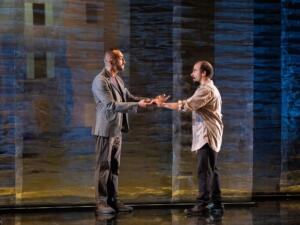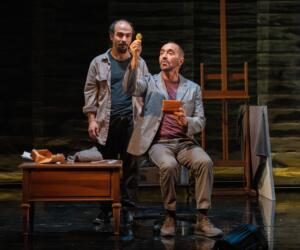
note to a friend, composed by Pulitzer prize-winning composer David Lang, is a chamber opera inspired by three texts by Japanese author Ryunosuke Akutagawa, the father of Japanese short stories—”Death Register,” In a Grove, and “A Note to a Certain Old Friend.” Co-produced with Tokyo Bunka Kaikan, the opera received its world premiere at the PROTOTYPE 2023 festival. Paris-based theater luminary Yoshi Oida directs this production to an almost full house audience at the Japan Society in New York City.
Rather than adhere closely to the original texts, Lang exerted much creative control in his loose operatic adaptation. He wrote in his composer’s note:
as someone who has lived his whole life in the United States, I would have no ability to put myself into the mind of a Japanese writer, and I would not be able to put myself into the mind of a Japanese writer, and I would not be able to begin to understand the complicated role that suicide has played in the Japanese imagination. […] I could not write a piece that was “true” to the text, or biographical, or accurate, or in any way about the real Akutagawa, but I could invent a character that was based on what I felt and understood, after reading his text.
This resulted in a poignant and intimate chamber opera with two characters, the dead man played by German jazz singer Theo Bleckmann who comes back to tell his story to his friend played by Cyrus Moshrefi, a non-speaking role, which can be thought of as a mediating figure between the protagonist and audiences. Lang’s music, comprised of a string quartet, exudes an ethereal quality that unsettles at times.

The dead man, played by Theo Bleckmann on the left, and the friend, a non-speaking role played by Cyrus Moshrefi on the right. Photo Credit: Richard Termine.
The dead man opens the opera with a hypnotic inducing libretto circling around “people who kill themselves.” People are complicated; money, health, and love are not the reasons driving the protagonist to commit suicide. It begins with a “vague anxiety,” as he reveals.
In the following numbers, he conveys to us a series of unfortunate incidents that took place in his life, which presumably contribute to his eventual suicide. The death of his insane mother when he was eleven, which made him laugh though he was sad. No tear was shed even when he tried. The premature death of his sister before he was born, who appears as phantom to watch over him at times. The death of his father whom he had little affection for.
Objects such as the scarf, watch, and small box are used for visual storytelling on stage, as they stand in for the mother, father, and sister respectively. Aesthetic economy is demonstrated in the director’s use of minimal materials to evoke the greatest emotional resonance in audience members.

The dead man holding on to the small watch that reminds him of his father. Photo Credit: Richard Termine.
These tragic events culminate in the number, “my mother, my sister, my father” as the protagonist details the three of them being buried under the same black tombstone. He muses over who might be the happiest now. The ensuing number has him pondering over the different ways to end his life. The poetic strings undergirding this number lends a particularly haunting touch to this scene.
A wry humor is invoked at the end, as the protagonist deliberates over his options very carefully. Hanging is out of the question for he cares how he would look dying in this way. Drowning is not an option too, as everyone knows that he is a “beautiful swimmer.” The idea of shooting himself to death makes him tremble, and jumping off a building would be too ugly and public. Finally, he decides on using drugs. Even though it induces a slow and painful death, his dignity is preserved in this way as he would “still look like [himself].”
Lang’s hauntingly beautiful musical language paired with Oida’s evocative staging approaches a difficult subject with great empathy, opening up new kinds of experiences for audiences today.
This post was written by Jingyi Zhang.
The views expressed here belong to the author and do not necessarily reflect our views and opinions.
The full version of the article “note to a friend” at PROTOTYPE 2023 Festival is available on The Theatre Times.